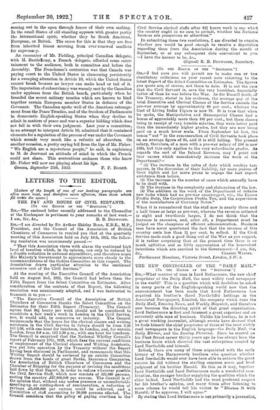LETTERS TO THE EDITOR.
[Letters of the length of one of our leading paragraphs are often more read, and therefore more effective, than those which fill treble the space.] THE PAY AND HOURS OF ciV.u, SERVANTS. [To THE EDITOR OF THE " SPECTATOR."3
Sut,—The enclosed letter recently addressed to the Chancellor of the Exchequer is pertinent to your remarks of last week.-
1 am, Sir, &c., R. B. DITNWOODY.
am directed by Sir Arthur Shirley Berm, K.B.E., M.P., President, and the Council of the Association of British Chambers of Commerce to remind you that at the quarterly meeting of this Association held on July 19th, 1922, the follow- ing resolution was unanimously passed:—
" That this Association views with alarm the continued high level of taxation which, in its opinion, can only be reduced by a drastic reduction in national expenditure, and therefore urges His Majesty's Government to approximate more closely to the recommendations of the Geddes Committee in this respect. The Association draws particular attention to the continued excessive cost of the Civil Services."
At the meeting of the Executive Council of the Association held. on August 2nd, 1922, the Council had before them the Fifth Report from the Select Committee on Estimates. After consideration of the contents of that Report, the following resolution was unanimously adopted, and I was instructed to transmit it to you :—
" The Executive Council of the Association of British Chambers of Commerce thanks the Select Committee on the Estimates for their Fifth Report (Treasury). The Council agrees that 341 hours per week should not be considered to constitute a fair week's work in London in the Civil Service, nor, it would add, in commerce or industry. The Council 'recommends that the hours for the clerical classes and writing assistants in the Civil Service in future should be from 9.30 .till 5.30, with one hour for luncheon, in London, and, for outside 1.ondon. from 9.0 a.m. till 5.30 p.m., with one hour for luncheon. The Council is surprised that the National Whitley Council's report of February 17th, 1920, which fixes the current conditions of employment of the Clerical classes and Writing Assistants, was put into operation by the Treasury without the Report having been discussed in Parliament, and recommends that this Whitley Report should be reviewed by an outside Committee drawn from the heads of great Banks, Insurance Companies, the Association of British Chambers of Commerce and the Chamber of Shipping for the purpose of revising the conditions laid down by that Report, in order to reduce wherever possible the Civil Service Staff, which now consists of 325,000 persons, costing the country £67,000,000 per annum. The Council is of the opinion that, without any undue pressure or uncomfortable Speeding-up or cutting-down of remuneration, a reduction of perhaps £5,000,000 per annum could be achieved, and a diminution of staff amounting to 20,000 persons effected. The Council considers that the policy of paying overtime to the Civil Service clerical staffs after 34,1 hours work is one which the country ought in no case to permit, 'whether the National finances are prosperous or otherwise."
In submitting these two resolutions, I am directed to enquire whether you would be good enough to receive a deputation regarding them from the Association during the month of September, or at any subsequent date convenient to you.
—I have the honour to be, &c., (Signed) R. B. Duevroonr, Secretary.


































 Previous page
Previous page